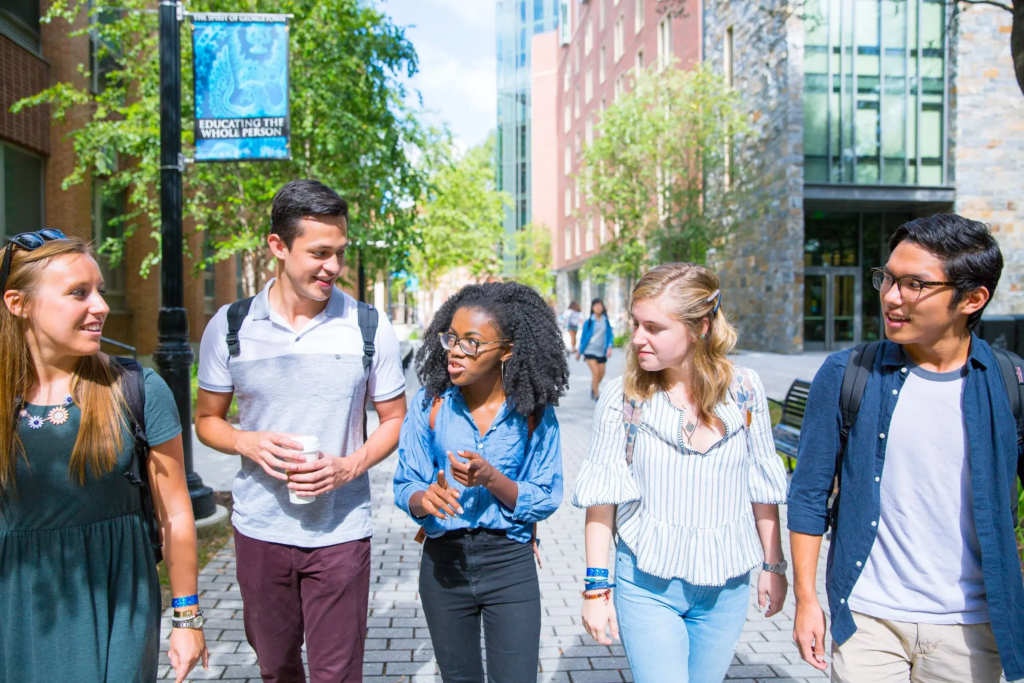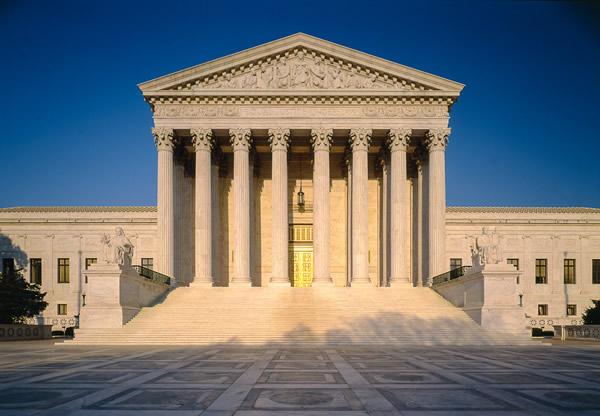In the wake of the Supreme Court’s decision this summer limiting the use of race-based affirmative action in college admissions, the Department of Education (DOE) has issued new admissions guidance to colleges and universities.
Despite widespread opposition from students, professors and university administrators — including many Georgetown University Hoyas — the Supreme Court ruled that admissions practices at Harvard University and the University of North Carolina violate the equal protection clause of the 14th Amendment.
Chief Justice John Roberts wrote the majority opinion for both cases, saying the practices at both schools “unavoidably employ race in a negative manner” and “involve racial stereotyping.” All three liberal justices dissented from the opinion. Justice Ketanji Brown Jackson recused herself from the case involving Harvard because she served on the Harvard University board.
The decision in the cases, Students for Fair Admissions, Inc. v. President and Fellows of Harvard College and Students for Fair Admissions, Inc. v. University of North Carolina, will force colleges such as Georgetown to reevaluate their admissions policies for the Class of 2028 and beyond.
Many students, including Kathleen Felli (CAS ’24), took to social media in the days after the ruling to voice their frustration and concerns about how the decision will impact prospective students of color.
“I wasn’t particularly surprised that conservative judges, who are aligned with conservative politicians, [are] stripping away these methods of access for low income and for non-white people,” Felli told The Hoya.
In response to the Supreme Court’s ruling, the DOE released a letter Aug. 14 which states their commitment to continue supporting diverse educational environments.
Many universities considered race in the admissions process in order to achieve a diverse student body. While race quotas were ruled unconstitutional in 1978 in University of California v. Bakke, race still remained a factor in admission.

Following the Court’s decision, University President John J. DeGioia (CAS ’79, GRD ’95) said Georgetown will follow the law established by the ruling while remaining committed to diversity.
“While we are deeply disappointed in today’s decision and will continue to comply with the law, we remain committed to our efforts to recruit, enroll, and support students from all backgrounds to ensure an enriching educational experience that can best be achieved by engaging with a diverse group of peers,” DeGioia wrote in a statement.
Paths Forward: Essays, Legacies, Initiatives
The decision finds that students are not prohibited from mentioning race in their application, such as in a personal essay, but that race could not be a defining factor in an applicant’s admission to a school, Roberts wrote.
Jackson, the first Black woman to serve on the Supreme Court, and Justice Sonia Sotomayor, the third woman and first Latina to serve on the court, both strongly dissented to the conservative justices’ opinion.
In her dissent, Sotomayor wrote that the ruling essentially calls for “colorblindness” in a “segregated society where race has always mattered and continues to matter.” Sotomayor and Jackson also criticized the Supreme Court’s ruling that this decision would not apply to military academies.
“The Court has come to rest on the bottom-line conclusion that racial diversity in higher education is only worth potentially preserving insofar as it might be needed to prepare Black Americans and other underrepresented minorities for success in the bunker, not the boardroom,” Jackson wrote.
The Georgetown University Center on Education and the Workforce found that if the Supreme Court barred the use of race-conscious admissions policies, the number of students from historically underrepresented racial and ethnic groups at selective colleges and universities would likely decrease or stall.
Andrew Wong (SFS ’26) witnessed firsthand the roughly 80-minute announcement live in the courtroom. Wong said he supports the Supreme Court’s decision on a constitutional basis and agreed with Roberts’ suggestion that students could still mention their race through their essays if it is important to their identity.
“This ruling doesn’t shoot down race as a thing you can use in college,” Wong said. “If race is central to your identity, and for some people it is, you can write about it in your essay.”
Wong said that he values Georgetown’s commitment to diversity and respects Georgetown’s stance.
“Georgetown said they are going to comply with the ruling and they will find ways to foster diversity here on campus and I’m sure they will,” Wong said. “I’m always in support of that.”
One factor that will continue to be accounted for in admissions decision-making — regardless of whether a student chooses to include it in their essay — is legacy status.
In the past, students and faculty have advocated for an end to legacy preference; a 2020 petition to do so garnered nearly 650 signatures. A similar new effort is underway, headed by the Georgetown University College Democrats and several other political and cultural groups, which had received over 300 signatures as of Aug. 31.
Georgetown University Student Association President Camber Vincent (SFS ’24) said he hopes the university will take on more diversity, equity and inclusion initiatives in light of the Supreme Court’s ruling.
“I hope that our academic and admissions administrators will take significant steps to promote diversity, equity, and inclusion at Georgetown through other practices, and continue to build on previous dialogue around the impacts of the Supreme Court’s decision on Georgetown’s admissions policy,” Vincent wrote to The Hoya.
University, Minority Communities React
While the decision was widely predicted given the conservative majority in the Supreme Court, it was ultimately disappointing to many members of the academic community.
The Georgetown Black Law Students Association (BSLA), Georgetown University College Democrats and other student organizations condemned the Supreme Court’s ruling.
“With this ruling, the Supreme Court claims that hundreds of years of slavery, Jim Crow, redlining, and systemic racism in the highest forms of government have all been erased within only fifty years of affirmative action,” BSLA wrote in a statement posted to their social media accounts.
“It is by design that Black people continue to bear the consequences of hundreds of years of racism and discrimination,” the statement continued.
Affirmative action policies have been used in higher education admission policies, including at Georgetown, for decades. Universities have used the policy for years to select the makeup of their student bodies, something that the Supreme Court had previously respected.
Georgetown, together with 56 other Catholic colleges and universities, filed an amicus curiae brief in August 2022 in the cases, advocating for the court to uphold affirmative action.
In the brief, Georgetown, together with Boston College, the University of Notre Dame, Villanova University and others, argued that affirmative action, used as part of a holistic admissions process, helps create a diverse learning environment, which allows the universities to promote Catholic values including social justice and service.
“Catholic teachings emphasize the dignity of each individual and the importance of service to the underrepresented,” the brief reads. “Diversity creates a learning environment that furthers the pedagogical goals of Catholic colleges and universities, including rigorous thinking, understanding of and empathy toward people of different backgrounds, concern for the poor and underserved, and leadership in service to others.”
Georgetown has historically supported affirmative action when it has come before the court, filing similar briefs in cases such as Grutter v. Bollinger, in which the court upheld a race-conscious law school admissions process at the University of Michigan in 2003, and Fisher v. University of Texas at Austin, in which the court upheld a race-conscious undergraduate admissions program in 2016.
Affirmative action is also used in medical school admissions, including at the Georgetown University School of Medicine (GUSOM). In a recent statement, Dr. Edward B. Healton, the executive vice president of health sciences and executive dean of GUSOM, shared concerns over the effects this ruling may have on the American health care workforce.
“These rulings could have a chilling impact on the diversification of a broad spectrum of disciplines, and perhaps will be realized most acutely in the education of future doctors, nurses, health care administrators, and scientists,” Healton said.
“In order to have a diverse pool to care for people in America, we must have diverse schools, and we must continue to make access to these schools a reality for our underrepresented students,” Healton added.
GUSOM’s Latino Medical Students Association (LMSA) said educating diverse groups of medical students allows communities to benefit by producing equitable and accessible healthcare providers, citing an uptick in the number of Latino students attending GUSOM.
“This increase in Latino students has broadened the impact and reach of community-based initiatives at the School of Medicine,” Bara-Garcia wrote to The Hoya. “Student organizations have greatly benefited from having more Spanish-speaking students to better engage with the Hispanic communities of the DC area.”
Remaining Committed to Preserving Diversity
Lisa Kennedy (CAS ’25) is the director of community engagement and professional development for the Student Board of the Georgetown Scholars Program, which provides support for first-generation and low-income students. Kennedy said that in the wake of the Supreme Court’s decision, she feels Georgetown must reconsider the ways it attracts a diverse student body to its campus.
“I think we need to do a complete restructuring of prospective student recruitment and outreach, especially in a post-affirmative action world,” Kennedy told The Hoya.
Applicants who benefit from their legacy status are already reaping systemic advantages that do not exist for the beneficiaries of affirmative action, including access to expensive private schooling and tutoring, according to Kennedy.
“Children of legacies are already given so many different privileges. These children are more likely to have attended prep schools, feeder schools, private schools and to have the resources necessary to get things like tutoring and test prep and things like that,” Kennedy said. “It doesn’t make sense to incentivize legacy status even more.”
Felli said in the future she would like to see Georgetown move away from considering legacy status and standardized testing, both of which have historically benefited white applicants.
According to Felli, Georgetown should expand existing pathways to invite engagement from minority and first-generation, low-income students in light of the ruling.
Despite assuring that a rigorous academic environment would be upheld on campus, a university spokesperson did not answer directly whether Georgetown would reconsider its use of legacy admissions in light of recent developments.
“Georgetown University only admits students who will contribute to the academic rigor and thrive in our community,” the spokesperson wrote to The Hoya. “Georgetown carefully considers all applicants to the University and, as a result, our admissions process has always been as personalized as possible.”
Max Massick (CAS ’24) said he personally agrees with the Supreme Court’s decision.
“So the question in the Harvard case is not whether we like affirmative action or not, but instead whether we think the government has a compelling interest to which the policy is narrowly tailored,” Massick wrote in an email to The Hoya. “The answer that the court correctly came to is: no.”
Massick added that he feels existing metrics of race fail to account for the arrays of ethnic and national groups categorized under the same race in demographic assessments.
“Furthermore, there are only six boxes to possibly check. Why should we consider people from Iraq, India, Indonesia, and Japan in the same category? The fact is, race does not track diversity very well at all, and therefore, policies based on race are not ‘narrowly tailored’ to the compelling government interest,” Massick wrote. “The replacement should be a process that looks at every person as an individual, because everyone is much more than what checkbox they check.”
Felli said she fears minority students may interpret the Supreme Court decision as solely attributing their accomplishments to their race. She fears such a dynamic could exacerbate feelings of imposter syndrome, or self-doubt among high achievers, for students of color on Georgetown’s campus.
“I wondered just how that imposter syndrome is going to manifest now, especially since the Supreme Court, in some ways, validated it, and said, you know, in so many words that there are students in schools who are imposters,” Felli said.
“I just don’t feel like that should be the message that’s being sent from one of our most powerful institutions in the country,” Felli added.












